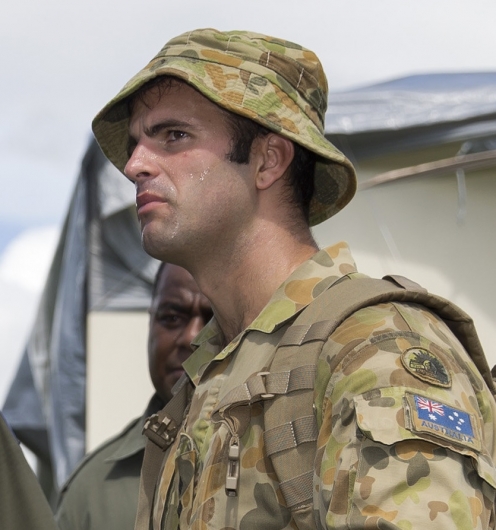‘It takes just one hour 30 minutes to construct and fit out an operating theatre in a disaster zone for an Australian Medical Assistance Response Team (AUSMAT)’, explains Abigail Trewin. Abigail is a long-serving AUSMAT member, a paramedic and Director of Disaster Preparedness and Response at the National Critical Care and Trauma Response Centre in Darwin.

Abigail Trewin. Image credit: Linda Roche/DFAT
Abigail grew up in Hobart and after finishing high school studied hotel management in the Blue Mountains. She worked in Yulara near Uluru and in her spare time volunteered as an auxiliary paramedic with the Royal Flying Doctor Service. ‘This is when I fell in love with emergency response’, she says. ‘I moved to Alice Springs to begin my ambulance training and was fortunate to work all over the Northern Territory in what has now been a 20 year career.’
I am proud to say Australia has an excellent reputation for providing help that is needed, appropriate and supports our neighbours to recover quickly when disaster strikes.
Abigail was one of many Australians who lent a hand in 2002 when a terrorist bombing in Bali took 202 innocent lives––including 88 Australians––and injured hundreds more. The incident had a major impact on Abigail’s career direction, cementing her passion for emergency and mass casualty response. ‘While my contribution was small, the impact of this event on the victims and their families was enormous’, she says. ‘I remember thinking that this was something I wanted to be involved in.’
In 2009, Abigail joined the National Critical Care and Trauma Response Centre, which coordinates AUSMAT responses. She has been involved in all overseas deployments, including to Pakistan, the Philippines, and Timor–Leste, and was the first female AUSMAT mission lead to Fiji after Cyclone Winston in 2016. Abigail sees the work of an AUSMAT team as crucial. ‘AUSMAT teams provide essential lifesaving care to those hurt in a disaster, working in partnership with the health professionals of the affected country—who will remain long after we are gone’, Abigail says.
AUSMAT teams deploy rapidly with Australian Defence Force assistance and are designed to be self-sufficient once they reach a disaster zone. The experienced teams consist of doctors, nurses, paramedics, fire fighters and allied health staff. Depending on the scale of the disaster, AUSMAT team sizes vary, ranging from a small team of four people to a field hospital with 80 staff. ‘I am proud to say Australia has an excellent reputation for providing help that is needed, appropriate and supports our neighbours to recover quickly when disaster strikes’, says Abigail.
Abigail’s job takes her away from her family for extended periods so she tries to help her young children understand why she needs to be away, by involving them in the lives of the people she is trying to help.
‘I asked them to write a letter and that letter, I took to another little girl in the Philippines…we had photos and she wrote back to my daughter’, Abigail says. ‘I think the key there is keeping them engaged and helping them to see how fortunate they are to live in Australia and to have the resources available to them and how we have a responsibility to help our neighbours.’

Paramedic Abigail Trewin in the Australian field hospital in Tacloban following Cyclone Haiyan. Abigail's daughter, Ella, wrote this get well card for her mum's patient. Image credit: AUSMAT




